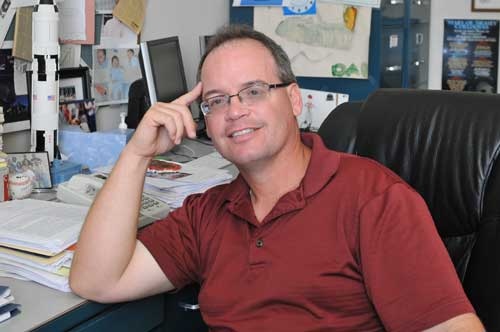Teaching students so they thoroughly understand the theory and mechanics of physics is a great goal for most physics professors. But for Professor of Physics Steve Doty it’s not enough. He wants them to unravel the “why” of what they’re learning — to move beyond mastering information to change how they process knowledge.
“I am convinced that learning is more than just facts. It involves the skillful use and analysis of some basic knowledge,” said Doty.” It is my goal to enhance the students’ ability to learn, to adapt their knowledge to new situations, and to communicate it effectively.”
He adds, “In striving for this goal, I try to follow the Chinese proverb ‘to learn is to ask, to see, and to do.’ We remember things we do better than things we are told – hopefully making the material a part of them rather than just a set of facts to be memorized.”
Doty, who was awarded a 2015 Charles Brickman Award for Excellence in Teaching, takes a “semi-meta-cognitive” approach in his classrooms. Rather than diving into the material from the beginning, the class spends time trying to understand “why” they are learning the information.
He asks his Physics 201 and Physics 121 students to read Isaac Asimov’s ‘Profession,’ and write about it before the first class session. “In the sciences, this is rather odd — especially for the sophomore majors and the predominantly junior-level pre-med students.”
On the first day, after the paper is turned in, they have a discussion. “I ask ‘Why in the heck did your crazy physics professor ask you to read that?’ The results have been interesting. About one-third of the students are stymied; they are looking for the ‘right answer.’ About one-third generally are on the fence wondering what this means for the next 14 weeks. And the final third get it and understand that it is the learning process, rather than the knowledge that is important,” said Doty.
“All of them, however, are uncomfortable. They report that it is rare that they have been asked to think about why they are going about the things they do, and it gives them pause.”
In physics, large amounts of information are boiled down to a small, fundamental set of principles, which are reapplied to an extremely wide set of situations. Doty’s goal is to help these students learn the perspective required to “induce + reduce + apply.”
Doty applies this approach to first-level classes as well. In his Astronomy 101, for non- majors, his goal is for his students to be “educated citizens; to be able to think well, to vote well, and as importantly, to answer their children well when they innocently ask ‘Mommy/Daddy, what is that?’ when they point up to the sky.”
“As a result, we learn math — but we don’t learn it for its own sake. We learn it so that we can understand that the Greeks knew the Earth was round long before Columbus; so that we know how to find size and mass; and to understand how we know the age of the universe.” Doty adds, “By having this approach, the students are willing to let me teach them everything from algebra to spectroscopy— and to ask them questions that are more than just recitation of previously learned facts.”
Doty finds that, as he moves into the semester, his students are willing and able to go further in their learning and thinking than they were at the start. Many of the problems they work on in class are real-life examples, which emphasize the importance of knowledge and of the “induce + reduce + apply” approach. This has proven to be quite effective.
“Fifteen years ago, a number of students would balk on an exam if they had to apply their knowledge to a truly new situation. Now, given the practice of doing it in class, that number is much smaller. They are willing to take a little leap and trust the principles that they understand,” said Doty. “If they can induce a reduced set of principles in physics and apply them to a seemingly new problem, then they have a model for how that might work in other phases of their life.”
